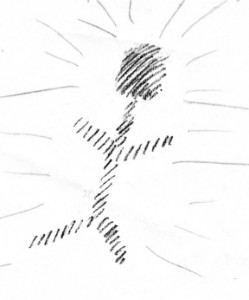
In the last post, I explained that Nestorians believe that a complete individual human nature is indiscernible from an individual human person.
Monophysites also take this idea very seriously. In fact, the Monophysite takes very seriously the more general claim that a complete individual nature of any kind is indiscernible from the corresponding individual that belongs to that kind (for instance, a complete individual cow-nature just is the individual cow in question). So if there are two natures in Christ, then there will be two individuals that correspond to each of those natures.
But the Monophysite does not want to say that there are two persons in Christ, so he will insist that there is just one nature in Christ. That way, there will just be one person. But since Christ is both human and divine, this one nature must be a special hybrid of divinity and humanity.
The strongest form of Monophysitism would claim that this hybrid Christness-nature has all divine properties, and all human properties. This, however, is incoherent, for it would amount to two persons as well. After all, having all the divine properties is sufficient for membership in God’s-kind, and having all human properties is sufficient for membership in human-kind. There would, then, still be two natures, which contradicts the initial claim that there is just one (allegedly) hybrid nature.
So the more careful Monophysite will want to say that Christ lacks at least some of the properties required for either or both of God’s-kind or human-kind. That way, there will not be two natures (and hence, not two persons).
This allows us to distinguish between various forms of ‘weak’ monophysitism. For example:
(a) One could say that Christ only lacks a human feature (e.g., rationality). That’s Apollinarianism (a weak form of Monophysitism).
(b) One could say that Christ lacks certain divine features (e.g., omnipotence). That’s kenoticism (a weak form of Monophysitism as well).
(c) One could say that Christ lacks certain divine features and certain human features (e.g., an Apollinarian-Kenoticist?), and that would be the weakest form of Monophysitism.

“It is a circular proposal anyway – determine which attributes are essential to divinity based on the kenosis of the pre-existent Son who is assumed to be fully divine…”
… which confirms how absurd is an ontological understanding of kenosis …
“Are we to conclude that omnipotence “typically comes along with divinity” but is not an essential attribute of divinity? And, therefore accidental (at least, according to The Philosopher)?”
It is a circular proposal anyway – determine which attributes are essential to divinity based on the kenosis of the pre-existent Son who is assumed to be fully divine…
@ JT Paasch
[1] “One could say that Christ lacks certain divine features (e.g., omnipotence). That’s kenoticism (a weak form of Monophysitism as well).”
[2] “… the kenoticist could argue that the properties the Son lays … are properties that typically come along with divinity, but which can be laid aside without destroying divinity. ”
Are we to conclude that omnipotence “typically comes along with divinity” but is not an essential attribute of divinity? And, therefore accidental (at least, according to The Philosopher)?
Hi James,
Sorry for taking so long to respond to this, but you make an interesting point.
I would think that Monophysites want to say that the incarnate Son is still fully divine (hence no polytheism there).
For instance, Apollinarians maintain that the Son has all divine properties, so by their reckoning, the Son would still be just as much God as the Father is.
The kenoticists are the more interesting case, for they believe that the Son lacks certain divine properties. Thus, one might think, wouldn’t the Son be a different kind of God than the Father (and hence, wouldn’t that amount to polytheism)?
Most kenoticists, I think, would say no to that suggestion. As they see it, the Son lays aside certain divine features (taking that famous passage in Philippians as their inspiration).
Still, if the Son lays aside part of his divine nature, wouldn’t that make him a lesser, or at least different, kind of God (and hence, wouldn’t that mean that we still have polytheism)?
Again, the kenoticist would say no. The kenoticist could argue here that for any given kind, there are some properties that are essential to that kind in the sense that the kind cannot exist without them, but there are other properties that typically come along with that kind, but which that kind can exist without.
And given that, the kenoticist could argue that the properties the Son lays aside are of the latter type. That is, they are properties that typically come along with divinity, but which can be laid aside without destroying divinity.
(One could, of course, come in here and say: fine, but whichever properties you say are essential to divinity, they are still present in the Son, so the Son would necessarily belong to the divine-kind. Hence, the Son does not forsake his divine nature after all. Thus, the only truly coherent form of monophysitism would be Apollinarianism.)
Hmm, worshiping both the Father and a hybrid Son sounds like polytheism to me.
I don’t know the answer to that, historically, but I presume the answer is yes. Anyone know differently?
Do/did monophysites worship the hybrid Christ?
Comments are closed.